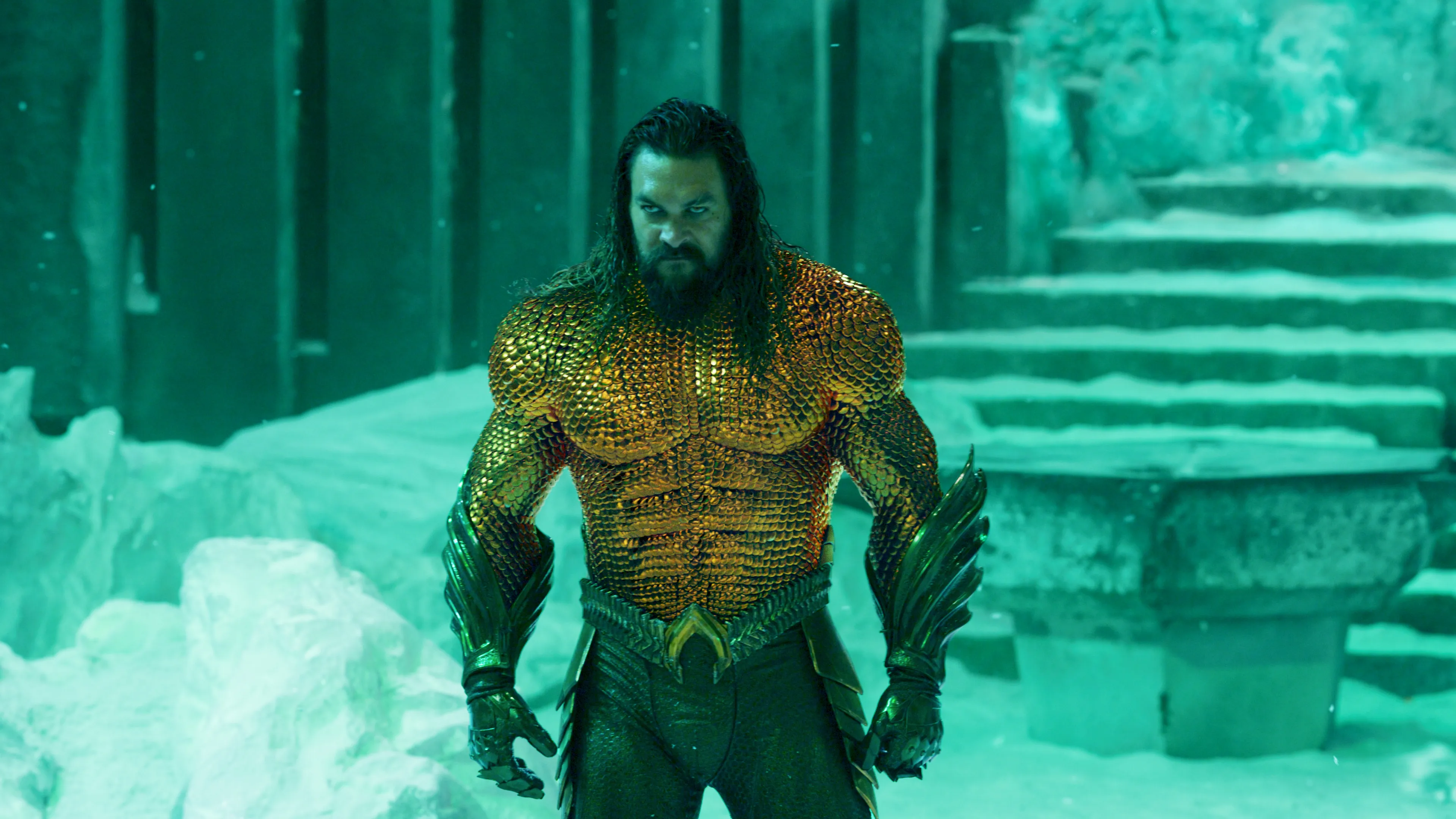
The nature of capitalism is such that commercial entertainment products don’t typically end with a bang; they keep making them until they die with a whimper. It’s hard to tell yet if comic book movies are in a lull or a death spiral, but it’s undeniable that the era of DC films that began with 2013’s Man of Steel comes to an end this week with Aquaman and the Lost Kingdom, a solid, if paint-by-numbers at times, movie that expands the character and doesn’t interest itself at all with the greater DC universe.
Preface: Superhero Movie Reviews
After almost fifteen years of superhero movies, many people are tired of watching superhero flicks–especially those that don’t particularly like superheroes or cape comics in the first place. Recent Marvel and DC film reviews have been pretty brutal for the most part, and it’s pretty hard to tell where the line is with regard to actual quality, expectations, and genre exhaustion. In other words, is a movie poorly reviewed because the reviewer was inclined to dislike it, or because it’s actually bad? Similarly, when a site like ours reviews a comic book movie, are we approaching it from a relatively neutral place, or are we inclined to give it some extra room? We go into this review knowing that we enjoyed the first Aquaman film and that we tend to enjoy comic book movies more than many reviewers will at this point. Keep that in consideration as we dig into our review.
Aquaman and the Lost Kingdom
For decades, Aquaman was a silly, clean-cut dork that spent most of his time as the butt of a big, decades-long Super Friends joke. Thanks in large part to very large man Jason Momoa, though, Aquaman’s image has been rehabilitated. Instead of being a dork that looks like a 1940s Olympic swimmer, he’s a burly dude covered in tattoos, with long, flowing hair and a rad beard. He looks like Poseidon (or Neptune if you conquered a nation and adopted its pantheon of gods).
It’s strange then that the movie opens with a monologue from Aquaman himself, Arthur Curry, about how he doesn’t care if people think his power is dorky, because he loves being a superhero. It feels like a thou-dost-protest-too-much moment. No one thinks you’re a dork, Arty. Everyone wants to either smooch you or be you. Just chill out.
Hell-Bent on Revenge
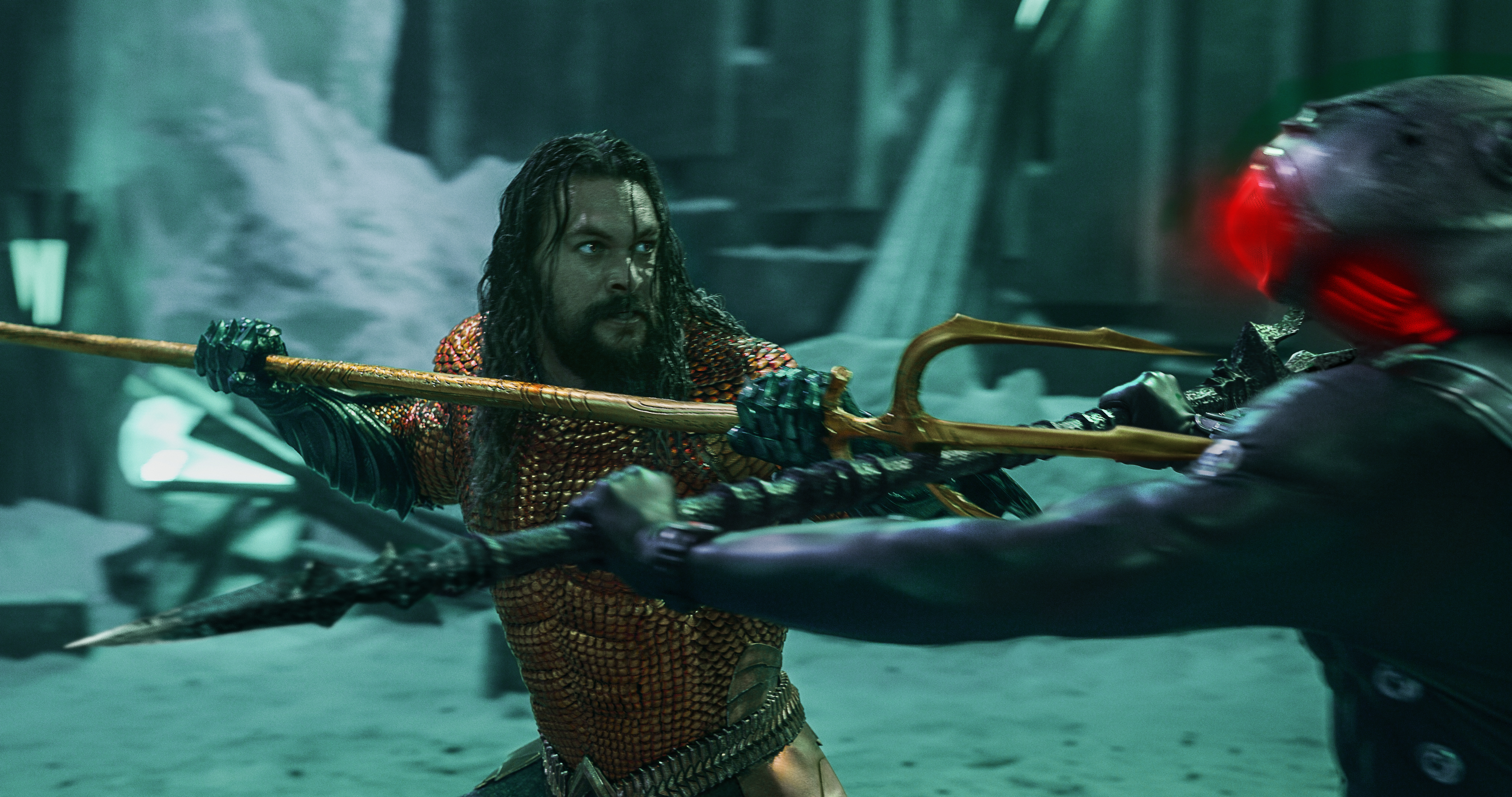
Here’s the synopsis: The Black Manta, searching in caves under the frozen landmass of Antarctica, finds a broken trident resembling that of Aquaman’s, except it’s black and glows with a haunting green energy. Some months later, the Earth is heating to heretofore unseen levels faster than even global warming should allow. When the warming reaches a dangerous point, Aquaman must reunite with his mortal enemy, his brother Orm (Patrick Wilson), to find the cause and put a stop to it.
In other words, the film is almost all returning cast, with the primary exception of Randall Park as Dr. Shen, a scientist who has been assisting Black Manta in his search for power.
Aquaman and the Lost Kingdom is, all in all, a pretty brainless movie, but that’s okay because it never acts like it thinks more of itself. It’s fun, loud, and more interested in color and light than in depth. There are things the movie could’ve gone deeper on; the whole film is a pretty heavy-handed story about global warming. At one point, Black Manta literally says “thank god for global warming.” It could’ve also explored Dr. Shen more–he’s a scientist who just wanted to see Atlantis and prove that it exists, and he aligned himself with a powerful man so hell-bent on revenge that he would sacrifice the planet itself and everyone on it to get the revenge that he so desired. What is that man’s culpability when his skills make him useful to a horrifying villain who could kill him at a moment’s notice?
Dos Hermanos
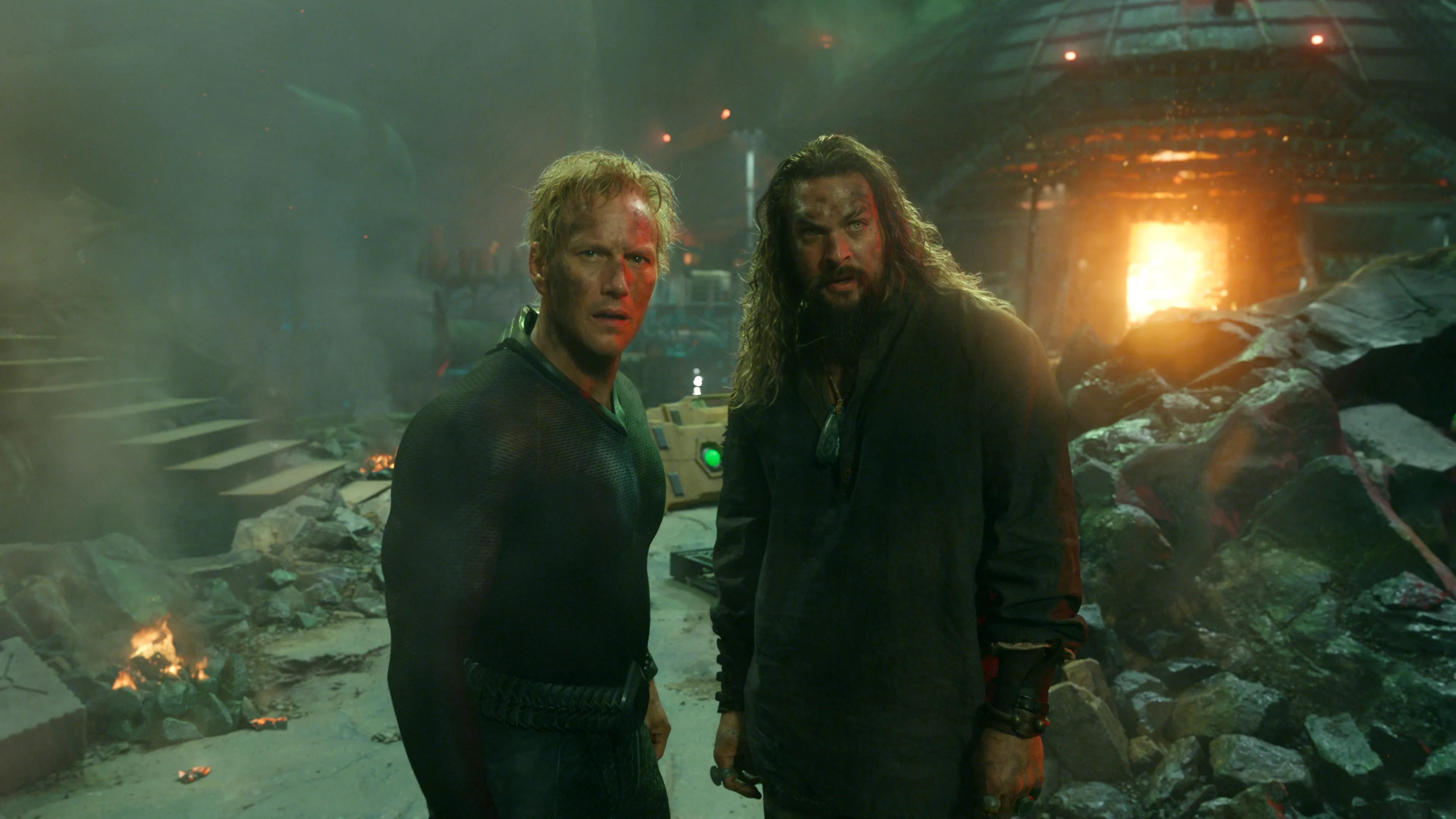
But that stuff is all just dressing for the core of the story, which is the relationship between Arthur Curry and Orm, his brother and the primary villain of the first film. Aquaman is king, but he hates the bureaucracy of the job even as he takes on the responsibility of it. Orm spent his life training for the job of king but craved the unchecked power that it would give him. When Aquaman realizes that the cause of the world’s rapid warming may be related to a forgotten undersea kingdom, though, he realizes he needs the help of someone as strong as he is but who has experience with undersea culture that he just doesn’t.
This all creates tension between characters with very different philosophies united by a mutual goal, and who both have to come to understand that they can learn from each other without becoming each other. The two brothers argue with, prod, and eventually learn to appreciate each other. Momoa and Wilson have stellar chemistry throughout the movie. When Wilson and Momoa stand next to each other, there’s a case to be made for Wilson’s Orm to almost be a ghost of the original, clean-cut Aquaman, while Momoa’s is the rock’n’roll headbanging Aquaman of the modern era. Wilson’s straight-man approach to his character makes some of Momoa’s jokes that might otherwise not land work pretty well, and scenes that should drag–like a sequence when the two are running from giant CGI bugs–instead work and stay fun.
King of Color
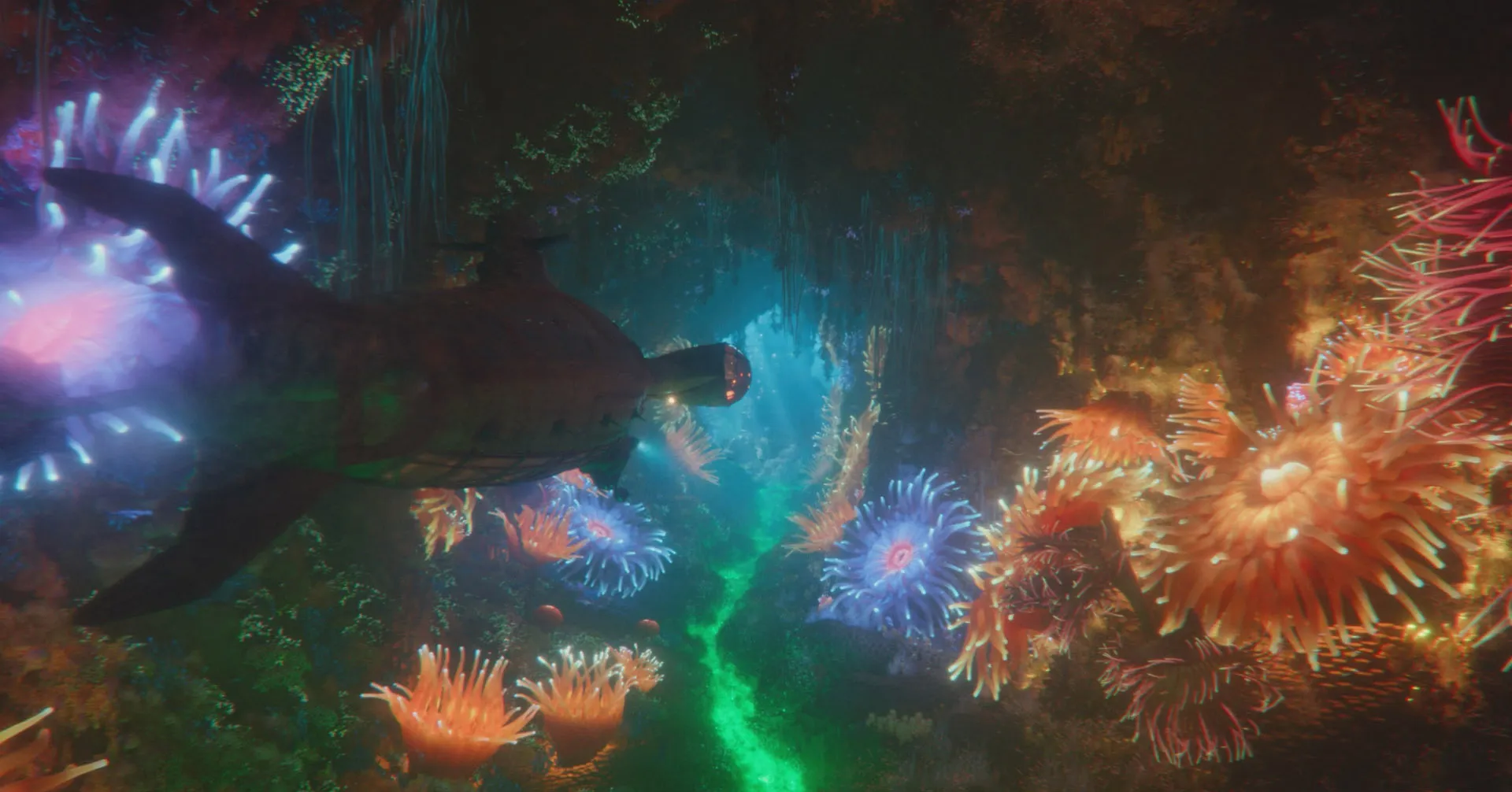
Visually, Aquaman is just as much of a feast as the original. This is of course a very CGI-heavy movie, but director Wan uses it to his advantage. Aquaman and the Lost Kingdom is a bright, colorful movie that takes us from Arthur’s lighthouse home to the bright pastels of Atlantis, neon-soaked vibes of the sea’s Mos Eisley-inspired underworld, and vibrant greens of the jungles of the titular Lost Kingdom. There are of course moments where the CGI could’ve used another pass, but most of it works, and it was easy to forget that I was watching actors on a CGI soundstage rather than being underwater, where humans typically don’t fare well. Compared to the approach of Namor’s Atlantis in Black Panther: Wakanda Forever, I prefer this slightly more cartoony take on the idea.
Drama, Complications, and Egos Unrelated
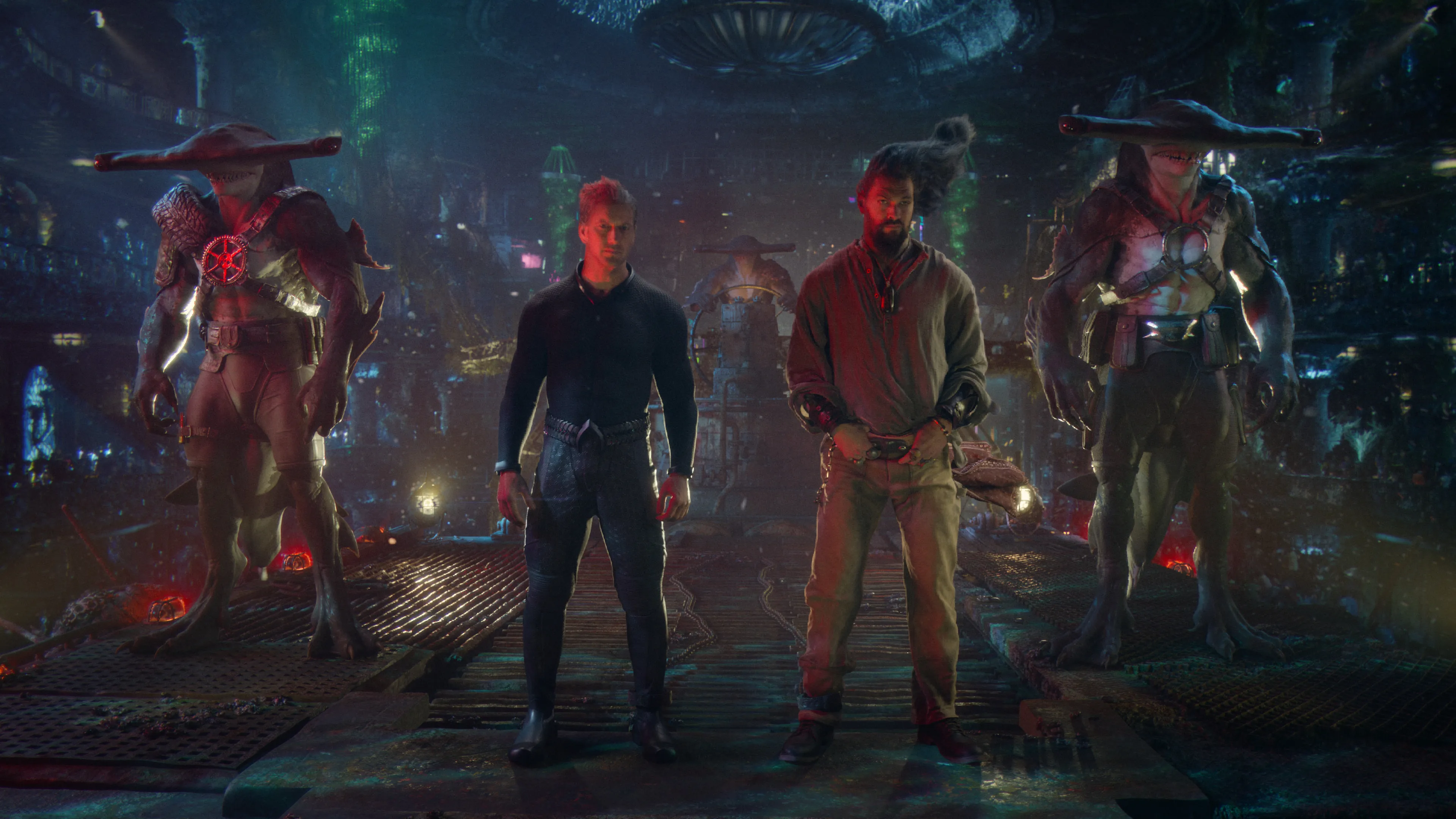
One of the things that has held Aquaman and the Lost Kingdom back throughout its development is all the drama around it. It’s the last film in the DCEU. One of its stars, Amber Heard, has been embroiled in a very public divorce and trial regarding an abusive relationship with Johnny Depp. The movie has undergone a bunch of reshoots and reschedules. It also comes hot on the heels of Shazam and the Fury of the Gods and The Flash both landing with dull thuds both critically and commercially.
None of that matters here. Heard’s Mera is here. She takes part in the story and even has a few crucial hero moments later in the film. If the movie was reworked to minimize Heard’s involvement, it doesn’t feel like it. Much of her on-screen time is most likely primarily CGI, and the story is about Arthur and Orm, so she’s in a secondary role anyway just by virtue of focus on those two. The movie almost entirely ignores the greater DC universe, too. Forget about cameos from Ben Affleck, Gal Gadot, or Henry Cavill–this is Aquaman’s movie. Like the first Aquaman, the undersea nature of this movie makes it easy to keep them out of the film without their absence seeming like a plothole. Like Superman fighting Kryptonians, this is Aquaman doing Aquaman Stuff.
In ignoring all of that baggage and focusing on what made Aquaman work, Aquaman and the Lost Kingdom largely works for the same reasons. Momoa is killer casting as the weirdo heavy metal dude turned king, and Wilson works well as the deposed usurper and villain turned hero, and is surprisingly funny throughout. The visuals serve the tone and story, and will likely work as well with international audiences as the first one did. James Wan didn’t break any new ground with Aquaman and the Lost Kingdom, but he did make a solid superhero movie that feels like a better ending to the DCEU than we could’ve expected and deserves more love than it’ll probably get when accounting for the response to those other recent DC movies.